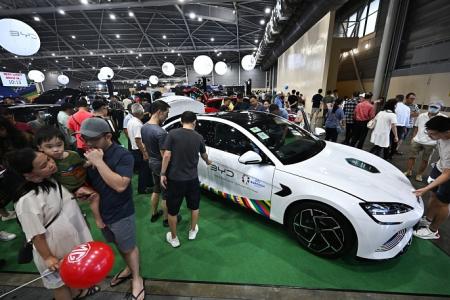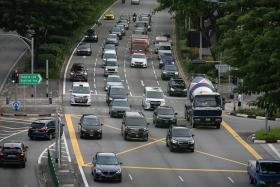$40,000 in rebates for electrical car buyers to continue
Those who buy an electric car here in 2025 will continue to get up to $40,000 in rebates, as part of efforts by the Land Transport Authority (LTA) to drive greater electric vehicle (EV) adoption.
LTA said in a joint statement with the National Environment Agency (NEA) on Sept 20 that it will maintain the current 45 per cent rebate off the Additional Registration Fee (ARF) for electric cars and taxis, capped at $15,000, under the EV Early Adoption Incentive (EEAI) scheme.
The zero-dollar ARF floor for electric cars and taxis will also be extended until Dec 31, 2025, which will allow mass-market EV buyers to continue maximising the rebates from the incentive scheme.
ARF is a tax that is levied when a vehicle is registered here, and it is calculated based on a percentage of the vehicle’s open market value.
Meanwhile, the NEA will maintain the maximum rebate of $25,000 for cars and $37,500 for taxis under the agency’s Vehicular Emissions Scheme (VES). The maximum rebate covers cars and taxis with zero tail-pipe emissions under Band A1 of the scheme. This includes most EV models.
However, new cars that fall under Band A2 – including high-powered EVs, most hybrids and smaller, more efficient internal combustion engine cars – will get a smaller rebate in 2025 of $2,500. This is down from $5,000 currently and $15,000 in 2023.
For taxis that fall under Band A2, the rebate amount will fall to $3,750 in 2025, down from $7,500 now and $22,500 in 2023.
LTA and NEA said most electric car models will enjoy the same level of rebates in 2025 as in 2024.
As an illustration, a BYD Atto 3 electric car with extended range and an open market value of $34,000 will continue to attract zero ARF after rebates.
Similarly, a Tesla Model 3 with a 110kW engine with an open market value of $47,647 will continue to attract an ARF after rebates of $22,529 in 2025, same as in 2024.
On the flip side, those buying the battery-powered Mercedes-Benz EQE300 sport utility vehicle, which falls under VES Band A2 and has an open market value of $77,689, will have to pay $112,723 in ARF in 2025, $2,500 more than in 2024.
LTA and NEA said the two vehicle rebate schemes, which work in tandem to reduce the cost gap between cars with internal combustion engines and cleaner-energy cars, have helped to boost adoption of electric and hybrid models. They noted that the proportion of such cleaner-energy cars among all new car registrations in Singapore has grown to 80 per cent in the period between January and August.
About a third of new car registrations in the same period were those of purely electric cars.
Since 2021, about 20,000 electric cars and taxis have either benefited from the EEAI or VES rebates, or both, LTA and NEA said. This is more than double the over 8,000 electric cars and taxis that had benefited from the two schemes between 2021 and September 2023.
The EEAI, which took effect in 2021, was due to expire in December 2023, but was extended by two years until end-2025.
LTA said at the time that this was to sustain the momentum of electric car adoption.
Singapore’s ultimate goal is for all vehicles to run on cleaner energy by 2040.
From Jan 1, 2025, new diesel cars and taxis can no longer be registered in Singapore, and from 2030, all new cars and taxis registered here will be required to be cleaner-energy models.
Ms Sabrina Sng, managing director at Wearnes Automotive, which distributes Swedish EV brand Polestar, said car buyers ultimately look at the sticker price, so having the same rebates for EVs in 2025 as 2024 is welcome as it keeps prices competitive.
As for the reduction in the rebate amount for Band A2 cars and taxis, Ms Sng views it as a signal by the authorities to push buyers towards pure EVs rather than hybrids.
“EVs still form a very small proportion of the overall car population, so we are still in the early-adopter days and the incentives are needed to encourage consumers to consider cleaner-energy car options,” she added.
As at Aug 31, there were 20,497 electric cars on the roads – 3.13 per cent of the 654,325 cars here overall.
Get The New Paper on your phone with the free TNP app. Download from the Apple App Store or Google Play Store now


